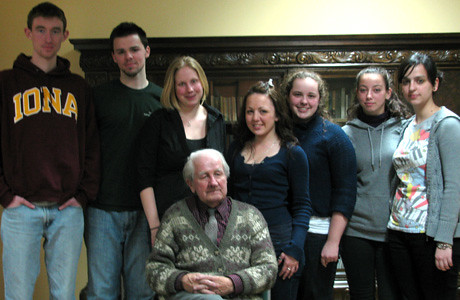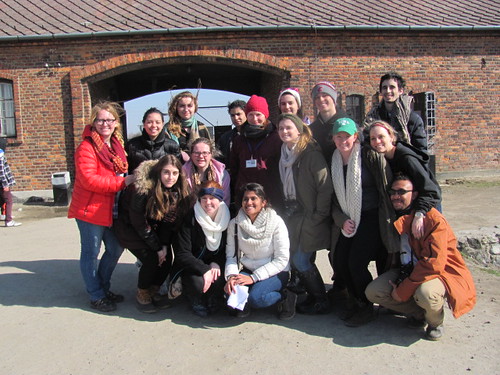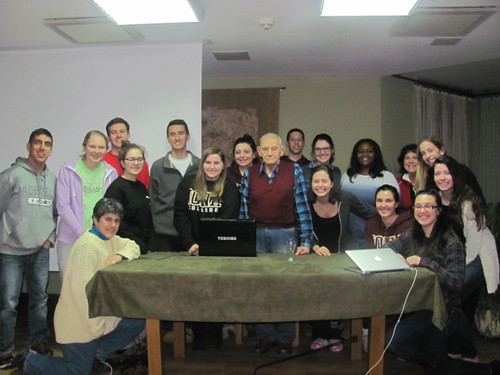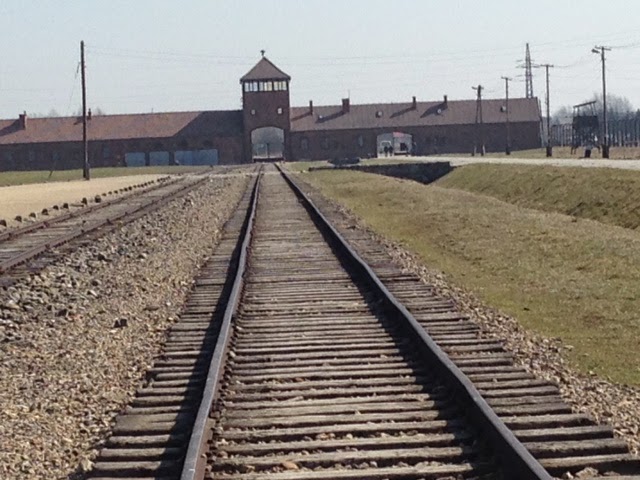 |
| Just a few of the amazing people from my trip! |
Recovery, Reconstruction, Reflection(A Day in Kraków): Blog Post 3
The Friday we spent in Kraków was surely one of the most wonderful days of my life. Upon arriving from our all to regular drowsy bus ride and a brief stop at the factory of Oskar Schindler, we headed for Galicia where we would be meeting with Rabbi Tanya and learned and reflected again on some amazing facts like: the first female Rabbi being a woman from Germany who was murdered in Auschwitz in 1942, that in pre-war Poland Jews had made up around 50-60% of all village populations and was now zero. We also had the wonderful opportunity to enjoy Rabbi Tanya's beautiful singing voice as well as learn about what her faith meant to her from her fascinating perspective of being a female rabbi who grew up during the height of Communism in Moscow!
Often Judaism is presented as perhaps very observant and concerned more with law and tradition, but through both of our meetings with Rabbi Tanya I was presented with a beautifully deep, natural spiritual Judaism filled with heavenly music, kosher grape juice, and perfect Challah bread. Spending the time with Rabbi Tanya certainly gave me the wonderful sense that there are efforts around Kraków to revive the wonderful Jewish tradition that is so embedded and simultaneously missing from post-Communist Polish culture, the efforts of reinstating Jewish culture in Poland from the debris of a half century of tyranny became more real in my mind.
After a nice lunch break in the cafe at the Galicia museum, and the acquisition of "The Course of Modern Jewish History" by Howard M. Sachar we were met by Ana and taken out for a day strolling through the Old Jewish section of Krakow, up towards the Wawel Castle and eventually into the beautiful Main Square. It was wonderful to see an extremely old cemetery in Krakow that was in much greater condition than the one we visited in the town of Oświęcim as well as the synagogue being renovated hopefully for future use, or at the least commemoration or memorialization. Another wonderful aspect of the Old Jewish section was the new Jewish Community Center that was donated or at least constructed under some sort of patronage from Prince Harry. It is an absolutely beautiful building and although we didn't go inside it seemed to have all the necessities as well as some luxuries that a city's Jewish community would need. Equally wonderfully there it was not guarded and maintained by a contracted security force, but the community itself.
Once again on this final day of our journey that for so many of us was defined by destroying certain comforts of our minds and forcing us to reexamine what we truly care for and should spend energy on, we are showed how wonderful reconstruction can feel and look.
After finishing our walk through the Old Jewish section we began the long, gratifying walk up the slope to Wawel Castle, gaining a perspective on the beautiful medieval city of Kraków that I never would have been so lucky to know if I hadn't visited. Beside from the obvious fact of our guide Ana being extremely well-versed on the matters of architecture and art history that were fascinating in and of themselves she also was constantly encouraging us with questions connecting the beauty we saw around Krakow to the context of why we had come to Krakow on this final day.
Just as to many people all concentration and death camps have become affiliated with Auschwitz as a symbol as Father Manfred said, Poland in modern consciousness has become lost in a swirling ether between the Shoah and Communism, to be frank I cannot think of many times in my life where Polish history culture or society have even been abstractly alluded to let alone focused on. Poland is thought of more so as the place it was than is trying to be, since so much visitation and outside interaction has to do with Shoah education and perhaps studying the effects of World War Two or Communism. That is why our time in Krakow was also so important, we were able to see that in many respects Poland is not different from the other great European cities that we glorify in the West, and because Krakow was not destroyed by bombing during the second World War I was able to gain a deeper appreciation of Krakow not just as a wonderful city in Poland, but one of the most beautiful in Europe. A place where the ground in certain buildings may be almost 800 years old. In our visit on Friday Krakow transformed from a Polish City, to a beacon of hope and source of transformation for Polish culture.
One of the first things I realized when reflecting on the trip as a whole was how absolutely impeccably organized the trip was not only on a day to day basis, but the entire arc of the week was also trying to make as deep of a statement as the mini-arc of our trips to Auschwitz and Birkenau. We do not commemorate the Shoah in the way that it must be commemorated simply by lamenting what happened and beating our breasts, but by fighting each day and moment for a more refined justice. A justice that opposes acts of inhumanity whether they are happening in China, Russia, Afghanistan, or America that we must not stand for a world where the basic humanity of all individuals is honored or we become deeply threatened for these injustices to swallow us whole again.
It is also become so apparent to me how important discussion and honest reflection are when speaking about these deep issues that should concern everyone on the planet. You cannot wax intellectually in a language that is inaccessible or else you naturally isolate those who are most important to the cause. Everyone's experience and what something felt like to them is valid regardless of their ability to express it beautifully, or ideally. We must talk to and teach every type of person about the importance of discussion and reflection when speaking about the Shoah or contemporary problems because we do not understand 6 million until you truly imagine 1 person dying 6 million times. There is no amount of WW2 videos that could express what can only be understood through true immersion and discussion. When we turn aspects of our humanity into statistics, they begin to lose real tangible meaning.
As I sit back in New Rochelle and begin to unpack my trip from Poland I can certainly only describe myself as feeling overwhelmingly mixed emotions. I have certainly come back with a shift in attitude, energy, and conviction. I have struggled with some nightmares and other small issues since coming back, but there is almost a deeper context and meaning informing my life than perhaps there was only a short world and it is not a feeling I would trade for the world.
































